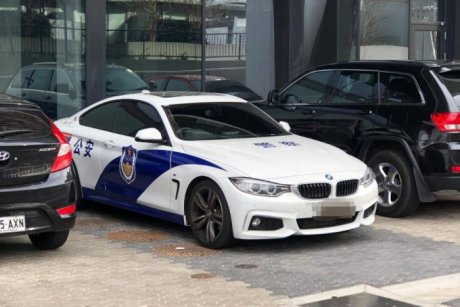US and China clash over Uyghur harassment in Australia and ‘fake police cars’

A car with what appears to be Chinese police markings parked at night.
Images of the fake police cars, taken around Australia, first emerged in August this year.
A diplomatic war of words has emerged between the American and Chinese embassies in Canberra, amid claims Beijing is harassing Uyghur minority people living in Australia.
Key points:
The US ambassador said Uyghurs were being “harassed by agents of a foreign power”
He said fake Chinese police cars were being parked outside their homes
China’s foreign affairs ministry said the allegation was “laughable”
Uyghurs and other mostly Muslim minorities have been subject to a wide-ranging security crackdown in China’s far-western Xinjiang region, where it is believed more than a million people have been rounded up and put in detention camps.
In an interview with ABC News Breakfast last Thursday, US ambassador Arthur B Culvahouse Jr said China was monitoring and intimidating Uyghurs living in Australia, and that this involved the use of fake Chinese police cars.
“Uyghurs who are lawfully in Australia, who are raised in Australia, working, paying taxes in Australia, are being harassed by agents of a foreign power,” he said.
“There’s police cars, fake police cars that are with Chinese police logos, parked outside their residences.”
Space to play or pause, M to mute, left and right arrows to seek, up and down arrows for volume.
US ambassador Arthur B Culvahouse Jr said Uyghurs were being monitored in Australia.
He said information on the activities of Uyghurs in Australia was being fed back to officials in China, and that action was then being taken against their remaining relatives in Xinjiang.
The Chinese embassy in Canberra hit back at Mr Culvahouse’s comments on the same day, saying in a short statement on its website that the claims were “nothing but rubbish” and “fake news”.
‘Arrest by algorithm’
The China Cables leak of highly classified documents reveals the scale of Beijing’s repressive control over Xinjiang, where more than a million Uyghurs and other Muslim minority groups are detained.
In a longer response, China’s foreign ministry spokesperson Hua Chunying said Mr Culvahouse’s allegations were “laughable”.
“He claims Chinese police travel all the way across the sea to threaten Uyghurs with fake police cars parked outside their residences,” Ms Hua told a press conference.
“Come on, even the worst screenwriter in Hollywood can do better than this.”
What do Uyghurs say?
Uyghurs in Australia and around the world have previously reported receiving threats, apparently in response to their activism against China’s policies in Xinjiang.
In some cases this has involved family members in Xinjiang, who they believed to be in detention, suddenly calling their overseas relative to ask them to stop campaigning.
A masked Uighur boy takes part in a protest against China, at Fatih Mosque in Turkey
PHOTO It is believed Uyghurs who actively campaign against Chinese policies are being targeted.
Other times it can involve unexpected calls from unknown numbers, with the person on the other end threatening the safety of the recipient’s family members in China if they don’t stop protesting.
Adam Turan, general secretary of the East Turkestan Australian Association, said he personally experienced intimidation after participating in a large anti-China protest in Canberra last year, held at the same time as other protests around the world.
Xinjiang families torn apart
China’s mass internment of its ethnic Uyghur population appears to be the largest imprisonment of people on the basis of religion since the Holocaust.
“After that, the community members started to receive phone calls from the consulate or the embassy,” he said.
“They are automated phone calls — they were even calling youth who were born here in Australia, they’re asking them to renew their visas, and they’re asking the immigrants to renew their passports.”
Mr Turan said he spoke to the Australian Federal Police about the issue last year.
It is not possible to confirm that these calls were legitimately from the Chinese embassy, and it is worth noting that the allegations seem to resemble a known international phone scam that has targeted the Chinese diaspora worldwide.
The calls are often pre-recorded, and claim to come from the Chinese embassy or consulate — sometimes the calls even come from numbers that appear to be linked to the local embassy.
The Chinese Embassy in Canberra.
The Chinese Embassy in Canberra has also previously warned of phone scams imitating its phone numbers.
The scammers later make a number of threats to attempt to get the victim to give up personal information like passport numbers and bank account details.
Uyghurs in Norway recently told the news organisation Al Jazeera about similar phone calls, which the Chinese embassy in Oslo said were linked to the scam.
Michael Clarke, an expert on the history and politics of Xinjiang at the Australian National University, said the claims of harassment in Australia were “consistent with pressures faced by Uyghur communities in the US, Canada and Western Europe”.
‘Speak up for me’
In a panicked phone call from China’s far-western region of Xinjiang, this qualified nurse reveals how she has been arrested and forced to work in a factory.
He said Beijing was looking to challenge the global narrative around its security crackdown in Xinjiang, and did not want Uyghurs living abroad to share stories about what was happening to their relatives there.
“Silencing Uyghurs living abroad — particularly those in open societies such as the US [and] Australia — is seen as contributing to this agenda, as it prevents such people from sharing first-hand accounts,” Mr Clarke said.
What about the fake police cars?
Mr Culvahouse’s allegation that fake Chinese police cars were being parked outside the homes of Uyghurs in Australia has not previously been reported.
Photos of cars with fake Chinese police decals first emerged in August this year, with reported sightings in Melbourne, Perth and Adelaide.
A car with what appears to be Chinese police markings parked in Adelaide.
Imitating a foreign police car is not a criminal offence in Australia.
The ABC approached the US embassy in Canberra for more details on these alleged incidents, and were advised to speak with Uyghur communities in Australia directly.
However Uyghur community leaders the ABC spoke to, like Mr Turan, said they were not aware of any instances of these fake Chinese police cars appearing outside Uyghur homes in Australia.
Fighting for their culture
China is perpetrating a “cultural genocide” against Uyghurs in Xinjiang, but in Australia, they are dancing in defiance in a bid to save their culture.
South Australian police also said they had not received any reports of that nature.
But Mr Turan said this did not diminish the emotional impact of seeing the cars in Australia.
“Even seeing the Chinese police cars in the streets of Australia, for example in Adelaide and in Perth, that’s obnoxious — members of my community certainly felt intimidated,” Mr Turan said.
“For the Australian people, or the police, or even the Chinese citizens who did this, for them it’s like a joke … it’s not a joke for us, that’s how the Chinese Communist Party caught people, with their police cars.”
At the time the cars first appeared, it was thought the owners were looking to intimidate people protesting in support of Hong Kong’s pro-democracy movement — however police in South Australia said one of the owners they spoke to had “no sinister intent”.
While imitating a foreign police car is not illegal in Australia, police said the owner “agreed to remove” the stickers after discussions with officers, in order to avoid any confusion.




